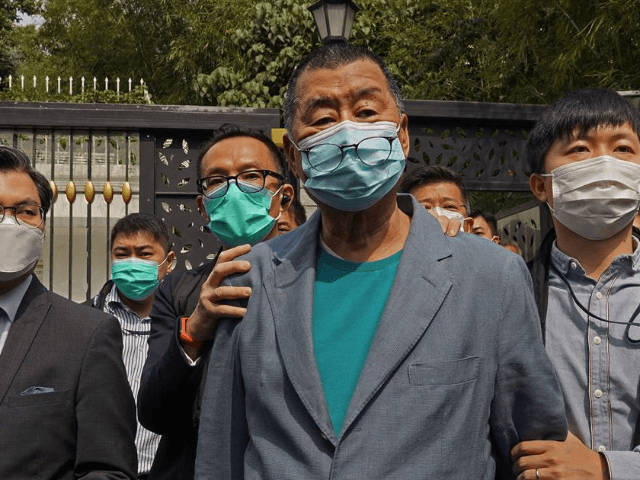Jimmy Lai, owner of Hong Kong’s Apple Daily and longtime pro-democracy activist, told Radio Free Asia (RFA) in an interview published Wednesday that he believed China’s communist takeover of the city would collapse its economy because its main selling point of being free of communist corruption had now disappeared.
Apple Daily, the flagship publication of Lai’s Next Media, is one of the most consistently pro-democracy, anti-communist newspapers in Hong Kong. Lai, 72, has been a fixture at pro-democracy protests in the city for years. He was arrested twice this year for his participation in peaceful protests and has experienced multiple attempted by unknown assailants to firebomb his home.
Lai smuggled himself out of his hometown of Guangzhou at the bottom of a fishing boat for a better life away from communism when he was a young man. Now, Lai told RFA he will not seek refuge anywhere else, but he does not blame anyone who does.
“Everything I have was given to me by Hong Kong. I won’t be leaving. I will advance or retreat with the people of Hong Kong,” Lai said, adding that he was not alone, “There are a lot of Hong Kong people who are going to stay here. They will fight this to the end.”
Yet Lai said that foreign investors and those not as established as he is will likely flee, collapsing the Hong Kong economy, now that China has passed a law allowing Beijing to imprison anyone it considers a threat to “national security.”
“Hong Kong is losing its entrepreneurs; its most capable people, the mainstay of society, its specialists; the business people are all leaving. But why won’t Shanghai be able to fill its role? Because there’s no rule of law there,” Lai explained. “China has always wanted to boost Shanghai so it could supplant Hong Kong, but it hasn’t managed it to this day because there is no rule of law in Shanghai, so it can’t attain the status of financial center. It can’t attract talent without that sense of mutual trust.”
“You can’t do business there without bribing people. Why would I want to do that? Why would talented people want to work in such a place?” he asked.
Lai pointed to the passage of the “national security” law as the catalyst for the economy flight.
“When the national security law comes, that will be the beginning of the end for Hong Kong. It won’t be like it used to be; there will be no more rule of law and no more freedom. People will feel as if they have to leave,” Lai said. “No matter how much they love this place, there will be nothing they can do about the situation. Nobody should try to stop them.”
“I won’t blame people for leaving. I won’t blame my employees. That’s the nature of freedom. But I’m going to stay here and fight to the bitter end,” the entrepreneur said, adding that he hopes other freedom-loving countries will take in Hong Kong’s refugees.
In late May, China’s National People’s Congress (NPC), the communist legislature, approved a move to pass the “national security” law, which is not written as the Communist Party typically passes laws before they are written, so no one can read and evaluate them beforehand. Supporters say the law is necessary because the year-long pro-democracy protests, which the local government has repressed but not ended, are a threat to the Communist Party. The law will allow Chinese police and state agents to detain and prosecute anyone present in Hong Kong for crimes such as “attempts to split the country, subvert state power, organize and perpetrate terrorist activities, including other actions that seriously endanger national security.”
The law, its detractors note, violates Hong Kong’s “One Country, Two Systems” policy, which does not allow Hong Kong to seek independence but bars China from imposing communist laws on the city. Any prosecuting of people present in Hong Kong by communist China runs afoul of the policy.
Shortly after the NPC announced that it had passed the law, the Hong Kong stock market collapsed and some of the world’s largest businesses reportedly began planning to withdraw from the city.
Lai’s interview follows multiple arrests for his outspoken defense of human rights in Hong Kong. In February, authorities arrested him for participating in a protest in August, on charges of allegedly creating public disorder. Lai, out on bail, was arrested yet again in April during a police sweep of pro-democracy senior citizens, allegedly necessary to maintain the safety of Hong Kong residents, police said.
After Lai’s first arrest, the Global Times, a communist propaganda outlet, published a story calling him a “criminal,” “traitor,” and “force of evil.” Lai was also featured in a communist video game called “Fight the Traitors Together” that allowed players to attack and kill prominent members of the Hong Kong pro-democracy movement.

COMMENTS
Please let us know if you're having issues with commenting.